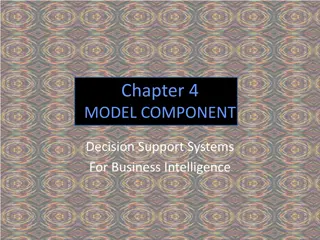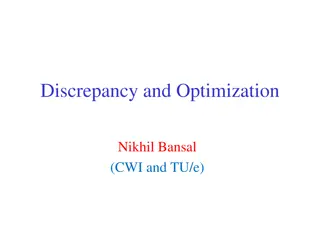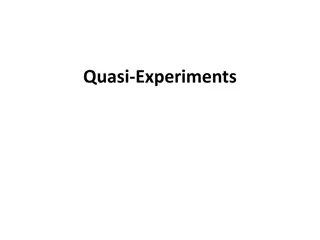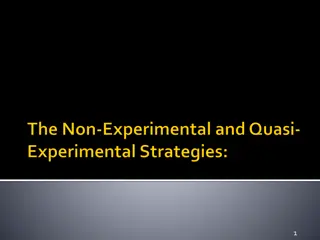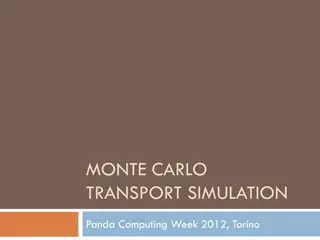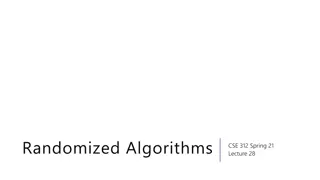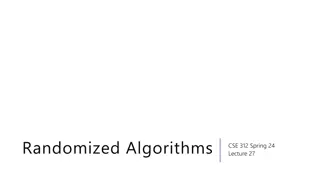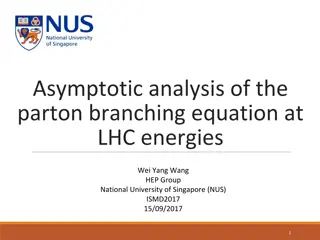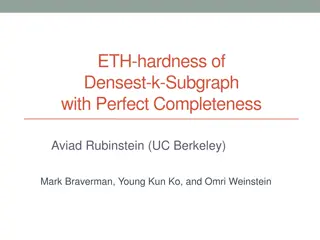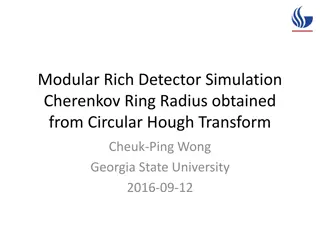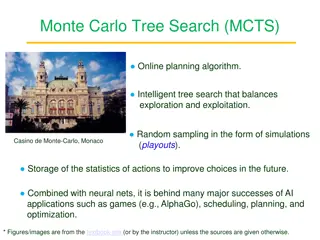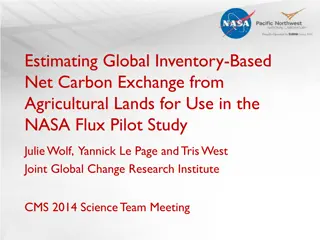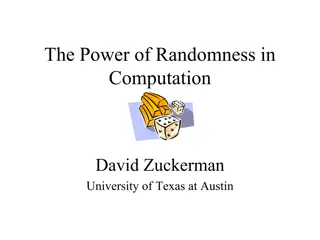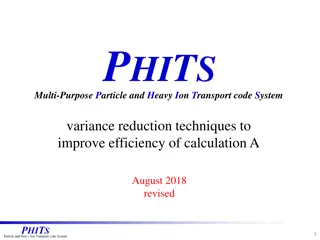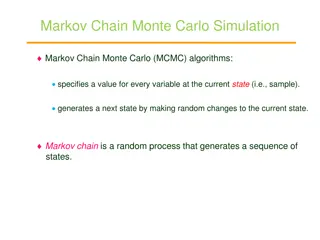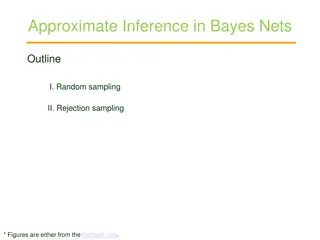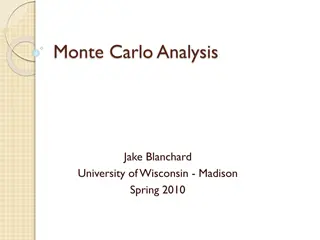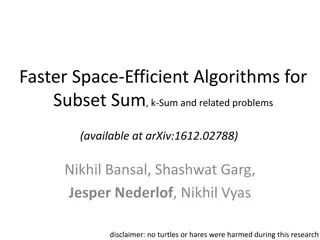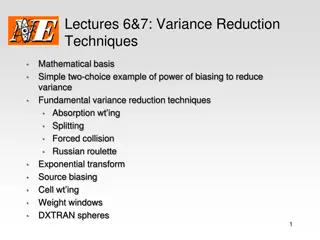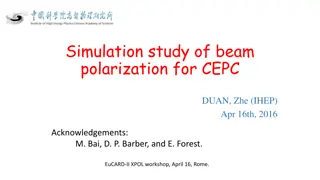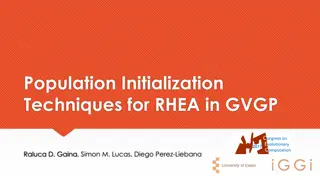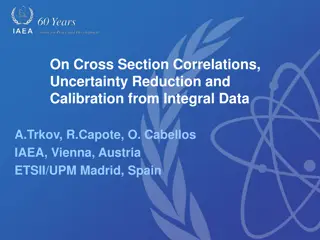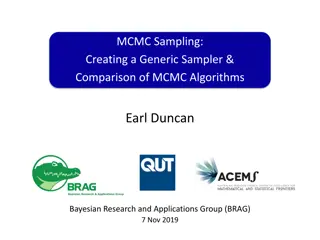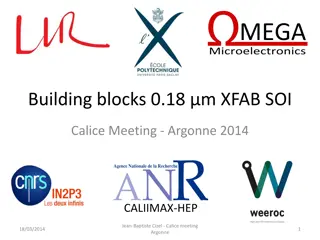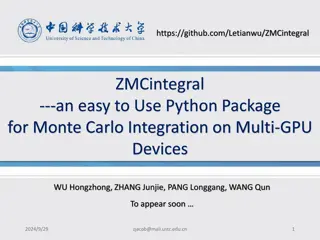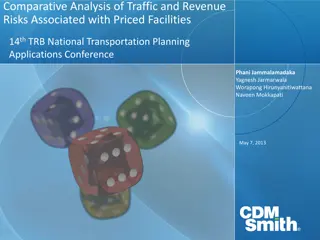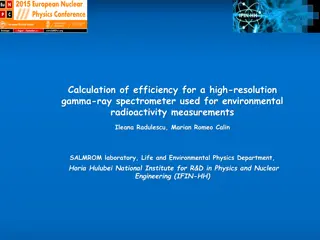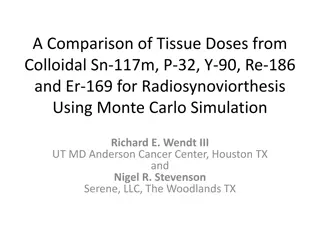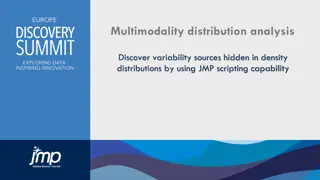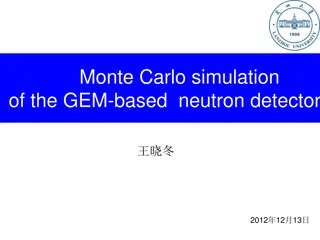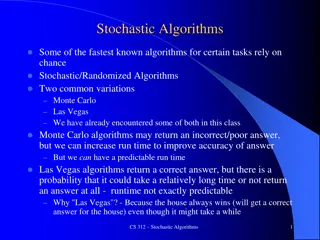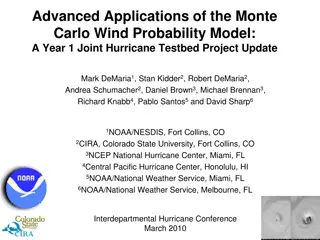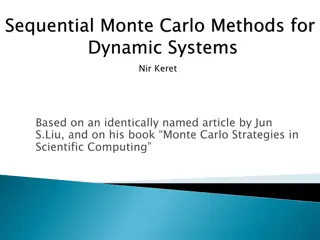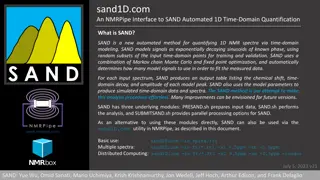Dark Matter Search with ATLAS: Active Learning Application
Explore an active learning application in the search for dark matter using ATLAS PanDA and iDDS. Investigate Beyond Standard Model physics parameters related to Hidden Abelian Higgs Model and New Scalar with a focus on cross-section limit calculations. Understand the process for generating Monte Car
0 views • 16 slides
Decision Support Systems for Business Intelligence Modeling
Explore the process of modeling in Decision Support Systems for Business Intelligence through images, tables, and examples. Learn about the dimensionality of models, nonlinear relationships, randomness, and Monte Carlo analysis as essential components in business decision-making.
0 views • 45 slides
System Modeling and Simulation Course Overview
This course covers the basics of systems modeling, discrete-event simulation, and computer systems performance evaluation. Topics include Monte Carlo simulation, probability models, simulation output analysis, queueing theory, and more. Professor Carey Williamson leads the course with a focus on pra
4 views • 21 slides
Understanding Discrepancy and Optimization in Mathematical Analysis
Discrepancy and Optimization, explored by Nikhil Bansal, delve into irregularities when approximating continuous data with discrete points. This concept addresses the challenge of distributing points uniformly in a grid and optimizing numerical integration or sampling techniques. Additionally, it to
0 views • 22 slides
Understanding Quasi-Experiments in Research
Quasi-experiments are research studies that resemble experiments but do not involve random assignment of participants to treatment groups. This approach is taken when random assignment is challenging or when ethical considerations come into play. Unlike true experiments, quasi-experiments can provid
0 views • 15 slides
Understanding Nonexperimental and Quasi-experimental Studies
Nonexperimental and quasi-experimental studies resemble experiments but lack random assignment, making them valuable for group comparisons without establishing causation. This type of research design looks at differences between groups that already exist, focusing on group differences rather than ca
1 views • 35 slides
Exploring Monte Carlo Simulations and Probabilistic Techniques
Dive into the world of Monte Carlo simulations and probabilistic methods, understanding the basic principles, the Law of Large Numbers, Pseudo-Random Number Generators, and practical Monte Carlo steps. Explore topics like conditional probability, basic geometry, and calculus through engaging exercis
3 views • 10 slides
Quasi-Judicial Roles and Ethical Responsibilities in Decision-Making
Exploring the distinction between legislative and quasi-judicial roles in decision-making processes, this content delves into examples, principles, and ethical responsibilities. It emphasizes fairness, impartiality, and the importance of public trust in upholding ethical standards within quasi-judic
0 views • 34 slides
Understanding Monte Carlo Transport Simulation
Monte Carlo simulation is a stochastic technique that uses random numbers and probability statistics to investigate and solve problems. In the context of transport simulation, a Monte Carlo program simulates the passage of particles through matter, involving geometry, transport, visualization, detec
0 views • 11 slides
Understanding Randomized Algorithms: Types and Examples
Explore the world of randomized algorithms through types like Las Vegas and Monte Carlo, with a focus on classic examples such as Quick Sort. Learn how randomness plays a crucial role in computation and discover the principles behind these algorithms. Dive into the applications of randomized algorit
0 views • 22 slides
Understanding Randomized Algorithms: A Deep Dive into Las Vegas and Monte Carlo Algorithms
Randomized algorithms incorporate randomness into computations, with Las Vegas algorithms always providing the correct answer but varying in time, while Monte Carlo algorithms occasionally give wrong answers. Quick Sort is a classic Las Vegas algorithm that involves pivoting elements for sorting. Ch
4 views • 21 slides
Insights into Parton Branching Equation at LHC Energies
Multiplicity distributions play a crucial role in understanding the cascade of quarks and gluons at the LHC energies, revealing underlying correlations in particle production. Popular models like Monte Carlo and statistical models are used to describe the charged particle multiplicity distributions.
1 views • 17 slides
Recent Applications of Quasi-Poly Time Hardness in Densest k-Subgraph
Recent applications of the Birthday Repetition technique have demonstrated the quasi-polynomial time hardness in various computational problems, including AM with k provers, Dense CSPs, Free games, and Nash equilibria. These applications also explore the potential implications in signaling theory an
0 views • 18 slides
Cherenkov Ring Radius Determination from Modular Rich Detector Simulation
Explore the process of obtaining the Cherenkov ring radius using Circular Hough Transform in a modular rich detector simulation. The study, conducted by Cheuk-Ping Wong from Georgia State University, delves into Monte Carlo results, ring finder algorithms, event displays, and radius distributions in
0 views • 20 slides
Exploring Monte Carlo Tree Search (MCTS) Algorithm in Online Planning
Monte Carlo Tree Search (MCTS) is an intelligent tree search algorithm that balances exploration and exploitation by using random sampling through simulations. It is widely used in AI applications such as games (e.g., AlphaGo), scheduling, planning, and optimization. This algorithm involves steps li
0 views • 16 slides
Estimating Global Inventory-Based Net Carbon Exchange from Agricultural Lands
This study aims to quantify global agricultural carbon fluxes by considering above- and belowground crop biomass, crop residues, livestock interactions, and human food intake. The methods involve combining inventory data and spatially resolved estimates of Net Carbon Exchange (NCE). Satellite-based
0 views • 16 slides
The Power of Randomness in Computation
Explore the significance of randomness in various computational aspects including random sampling, cooking techniques, polling methods, investing strategies, and its role in computer science. It delves into randomized algorithms, Monte Carlo simulations, cryptography, and more.
0 views • 45 slides
Efficiency Enhancement in PHITS: Variance Reduction Techniques for Particle and Heavy Ion Transport
Explore techniques for improving calculation efficiency in the PHITS Multi-Purpose Particle and Heavy Ion Transport code system. Topics covered include neutron deep penetration calculation, effective dose calculation, and use of variance reduction techniques to enhance Monte Carlo simulation efficie
0 views • 24 slides
Understanding MCMC Algorithms and Gibbs Sampling in Markov Chain Monte Carlo Simulations
Markov Chain Monte Carlo (MCMC) algorithms play a crucial role in generating sequences of states for various applications. One popular MCMC method, Gibbs Sampling, is particularly useful for Bayesian networks, allowing the random sampling of variables based on probability distributions. This process
1 views • 7 slides
Approximate Inference in Bayes Nets: Random vs. Rejection Sampling
Approximate inference methods in Bayes nets, such as random and rejection sampling, utilize Monte Carlo algorithms for stochastic sampling to estimate complex probabilities. Random sampling involves sampling in topological order, while rejection sampling generates samples from hard-to-sample distrib
0 views • 9 slides
Understanding Monte Carlo Analysis for Uncertainty Assessment
Exploring the concept of Monte Carlo analysis as a method of uncertainty assessment through sampling inputs, running models, and analyzing outputs. Learn how to simulate dice rolls, evaluate probabilities, and assess accuracy with sample size. Monte Carlo approaches are versatile and applicable to v
0 views • 70 slides
Faster Space-Efficient Algorithms for Subset Sum
This research discusses faster and space-efficient algorithms for Subset Sum and related problems, introducing techniques like Meet-in-the-Middle (MitM) approach and Monte Carlo algorithm. It also covers topics such as Floyds Cycle Finding, Element Distinctness (ED) by BCM, List Disjointness, and Su
0 views • 25 slides
Plasma Etching Challenges and Solutions in Semiconductor Fabrication
Understanding the importance of plasma etching in semiconductor fabrication, this discourse delves into the challenges faced in modeling modern etch processes. Topics covered include stochastic defect detection, reactor-level plasma physics, and an integrated model hierarchy approach. Techniques suc
0 views • 14 slides
Variance Reduction Techniques in Monte Carlo Programs
Understanding variance reduction techniques in Monte Carlo simulations is essential for improving program efficiency. Techniques like biasing, absorption weighting, splitting, and forced collision help reduce variance and enhance simulation accuracy. By adjusting particle weights and distributions,
0 views • 37 slides
Beam Polarization Simulation Study for CEPC
Simulation study on beam polarization for the Circular Electron Positron Collider (CEPC) using the PTC Poly- morphic Tracking Code. The study includes orbital and spin tracking, equilibrium polarization calculation, and Monte-Carlo simulation of depolarization rate. Comparison with other Monte-Carlo
0 views • 20 slides
Population Initialization Techniques for Rolling Horizon Evolutionary Algorithms in General Video Game Playing
Rolling Horizon Evolutionary Algorithms (RHEA) in General Video Game Playing (GVGP) show promise for faster evolution, but there is a lack of clear analysis in the existing literature. This study explores population initialization techniques for RHEA in GVGP, assessing methods like One Step Look Ahe
0 views • 17 slides
Insights on Cross-Section Correlations and Uncertainty Reduction
This study focuses on the calibration and reduction of uncertainties in criticality benchmarks by analyzing integral data and correlations not present in differential data. A simplified toy model is used to examine correlations in fission, capture, inelastic, and leakage components across different
0 views • 14 slides
Understanding MCMC Sampling Methods in Bayesian Estimation
Bayesian statistical modeling often relies on Markov chain Monte Carlo (MCMC) methods for estimating parameters. This involves sampling from full conditional distributions, which can be complex when software limitations arise. In such cases, the need to implement custom MCMC samplers may arise, requ
0 views • 31 slides
Optimization Strategies for Performance-Sensitive Semiconductor Products
Discover how using JMP can optimize semiconductor product performance across various conditions, emphasizing the impact on gross margin. Learn about the benefits of Monte Carlo simulation, statistical analysis, and consistent documentation in managing complex chip designs and customer requirements e
0 views • 20 slides
Comprehensive Study on XFAB SOI Technology for Digital Electronics
Analog building blocks using XFAB SOI technology with adjustable feedback capacitors, slow and fast shapers, simulation results, linearity up to 8.36 pC, discriminator efficiency, and Monte Carlo analysis. Issues regarding noise contributions and feedback capacitance are also discussed. Presented at
0 views • 13 slides
ZMCintegral: Python Package for Monte Carlo Integration on Multi-GPU Devices
ZMCintegral is an easy-to-use Python package designed for Monte Carlo integration on multi-GPU devices. It offers features such as random sampling within a domain, adaptive importance sampling using methods like Vegas, and leveraging TensorFlow-GPU backend for efficient computation. The package prov
0 views • 7 slides
Comparative Analysis of Traffic and Revenue Risks in Priced Facilities
This presentation at the 14th TRB National Transportation Planning Applications Conference discusses the background, process, and importance of sensitivity and risk analysis in traffic and revenue forecasts for toll road projects. It covers how risk analysis helps quantify uncertainties, determine i
0 views • 31 slides
Efficiency Calculation of High-Resolution Gamma-Ray Spectrometer for Environmental Radioactivity Measurements
SALMROM laboratory at IFIN-HH conducts environmental radioactivity monitoring using high-resolution gamma-ray spectrometry. The system includes a Coaxial p-type HPGe detector with reliable traceability. Activities involve evaluating radon concentrations in various environments and assessing radionuc
0 views • 13 slides
Comparison of Tissue Doses from Various Radionuclides for Radiosynoviorthesis
This study compares tissue doses from different radionuclides - Sn-117m, P-32, Y-90, Re-186, and Er-169 - for radiosynoviorthesis using Monte Carlo simulation. It explores electron range, half-life, and therapeutic absorbed doses to synovial tissues, presenting a hypothesis on the selection of radio
0 views • 12 slides
Analyzing Multimodality in Density Distributions Using JMP Scripting
Explore variability sources hidden in density distributions through JMP scripting. The analysis focuses on identifying and filtering distribution modes in semiconductor fab electrical measurements using kernel estimation and empirical rules. Antonio D'Angelo and Felice Russo from Lfoundry S.r.l. Ita
0 views • 6 slides
Monte Carlo Simulation of GEM-Based Neutron Detector and Detector Performance Analysis
A detailed exploration of Monte Carlo simulations for GEM-based neutron detectors, investigating their detection efficiency and performance characteristics. Various detector designs and concepts, including multi-layer converters and GEM detectors, are discussed, along with simulation results on sign
0 views • 12 slides
Exploring Stochastic Algorithms: Monte Carlo and Las Vegas Variations
Stochastic algorithms, including Monte Carlo and Las Vegas variations, leverage randomness to tackle complex tasks efficiently. While Monte Carlo algorithms prioritize speed with some margin of error, Las Vegas algorithms guarantee accuracy but with variable runtime. They play a vital role in primal
0 views • 13 slides
Advanced Applications of Monte Carlo Wind Probability Model in Hurricane Analysis
Update on the Year 1 Joint Hurricane Testbed Project, focusing on the Monte Carlo Wind Probability Model and its estimation of wind probabilities for different intensities. The model incorporates track and intensity error distributions, land proximity, and serial correlations to provide accurate for
0 views • 23 slides
Sequential Monte Carlo Methods for Dynamic Systems
This discusses Sequential Monte Carlo methods for estimating functions when direct sampling is difficult. It explains the basic idea, conditions on the distribution, handling known normalizing constants, weight diagnostics for importance distribution, and effective sample size considerations.
0 views • 37 slides
Automated Quantification of 1D NMR Spectra with SAND
SAND is an automated method for quantifying 1D NMR spectra using time-domain modeling by modeling signals as exponentially decaying sinusoids. It uses random subsets of input data for training and validation, combining Markov chain Monte Carlo and fixed-point optimization. SAND determines the number
0 views • 25 slides

